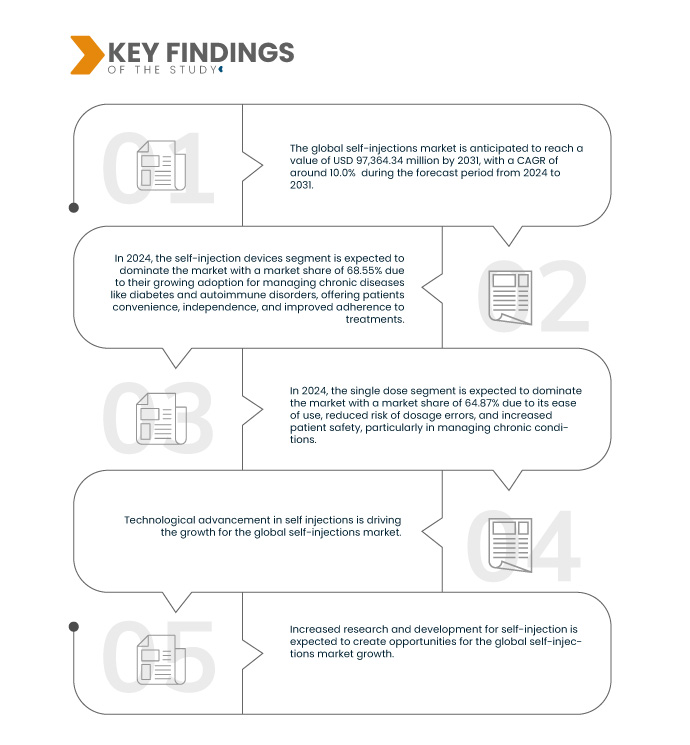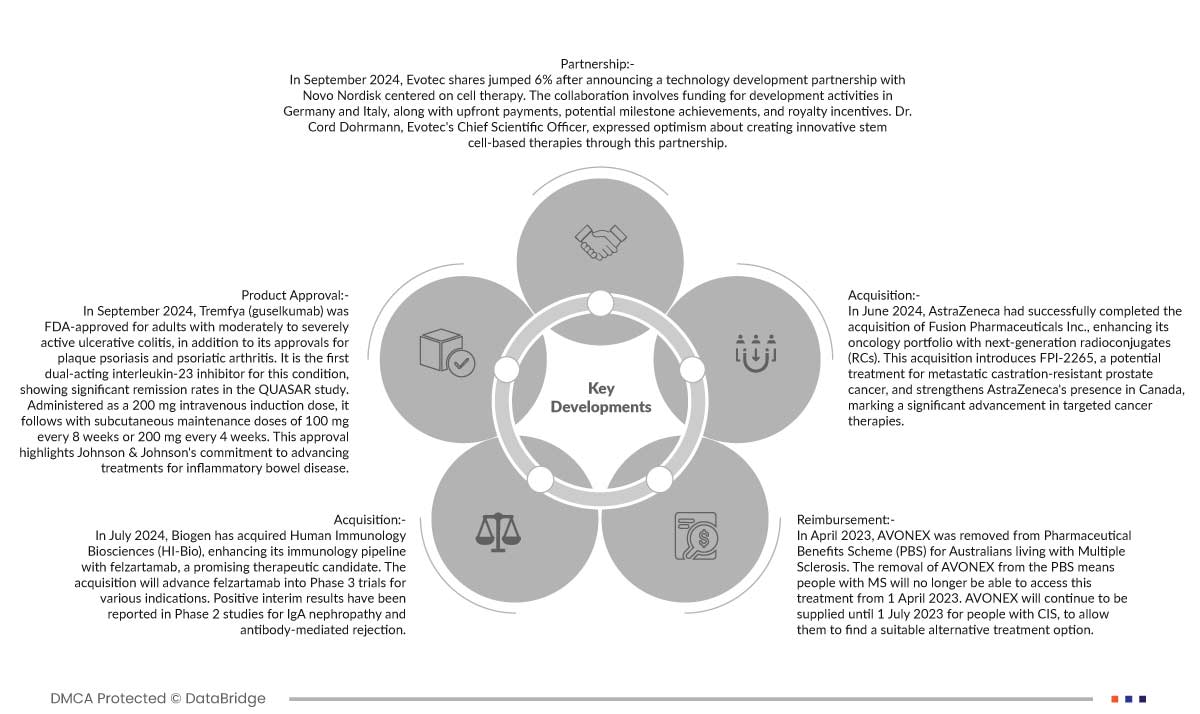A crescente prevalência de doenças crónicas , incluindo diabetes, artrite e esclerose múltipla , é um fator chave para o mercado da autoinjeção. Os doentes com estas condições necessitam frequentemente de medicação contínua, o que torna os dispositivos de autoinjeção convenientes e essenciais. À medida que a população global envelhece, a procura por opções de tratamento domiciliárias eficazes continua a aumentar. Os sistemas de autoinjeção permitem que os doentes controlem as suas condições de forma independente, reduzindo significativamente a necessidade de visitas ao hospital. Esta mudança não só melhora a adesão e a qualidade de vida dos doentes, como também alivia a carga sobre os sistemas de saúde, impulsionando ainda mais o crescimento do mercado. O crescente foco em soluções de cuidados de saúde personalizados apoia a expansão das tecnologias de autoinjeção, atendendo às necessidades de uma população diversificada de doentes que procuram maior autonomia nos seus regimes de tratamento. O aumento das doenças crónicas exige soluções de autoinjeção convenientes que aumentem a independência do doente e melhorem os resultados dos cuidados de saúde. À medida que aumenta a prevalência das doenças crónicas, cresce a procura por opções de tratamento personalizadas em casa e o mercado da autoinjecção está posicionado para uma expansão significativa, beneficiando tanto os doentes como os sistemas de saúde.
Aceda ao relatório completo em https://www.databridgemarketresearch.com/reports/global-self-injections-market
A Data Bridge Market Research analisa que o tamanho do mercado global de autoinjeções foi avaliado em 46,18 mil milhões de dólares em 2023 e está projetado para atingir 97,36 mil milhões de dólares até 2031, com um CAGR de 10,0% durante o período previsto de 2024 a 2031.
Principais conclusões do estudo
Avanço tecnológico nas autoinjeções
As recentes inovações na tecnologia médica resultaram na criação de dispositivos avançados de autoinjeção que priorizam a facilidade de utilização e a eficiência. Funcionalidades como autoinjetores, seringas pré-cheias e dispositivos inteligentes integrados em aplicações móveis melhoram significativamente a experiência do utilizador, oferecendo feedback e lembretes em tempo real. Estas melhorias aumentam a precisão da administração de medicamentos e reduzem a probabilidade de erros, tornando a autoinjeção mais atrativa para os doentes. À medida que a assistência médica muda cada vez mais para um modelo centrado no doente, espera-se que a procura por estas soluções tecnologicamente avançadas aumente. Esta tendência irá provavelmente impulsionar o mercado da autoinjeção, atendendo aos pacientes que procuram maior autonomia e uma melhor gestão das suas condições de saúde. Estas inovações não só aumentam a satisfação do paciente, como também contribuem para melhores resultados de saúde em geral.
Os recentes avanços na tecnologia médica levaram ao desenvolvimento de dispositivos de autoinjeção fáceis de utilizar, como os autoinjetores e as seringas inteligentes. Estas inovações melhoram a precisão da medicação e reduzem os erros, tornando a autoinjeção mais atrativa. À medida que a assistência médica se concentra mais nos doentes, a procura por estas soluções aumentará, melhorando tanto a satisfação dos doentes como os resultados de saúde.
Âmbito do Relatório e Segmentação de Mercado
Métrica de Reporte
|
Detalhes
|
Período de previsão
|
2024 a 2031
|
Ano base
|
2023
|
Ano Histórico
|
2022 (Personalizável 2016-2021)
|
Unidades quantitativas
|
Receita em biliões de dólares americanos
|
Segmentos abrangidos
|
Tipo de produto (dispositivos de autoinjeção e formulação de autoinjeção), forma de dosagem (dose única e multidose), via de administração (subcutânea, intramuscular e outras), aplicação ( doenças autoimunes , controlo da dor , medicamentos de emergência, oncologia, distúrbios hormonais e outros), faixa etária (adulto, geriátrico e pediátrico), género (masculino e feminino), canal de distribuição (licitação direta, farmácia hospitalar, farmácia on-line e outros)
|
Países abrangidos
|
EUA, Canadá, México, Reino Unido, Alemanha, França, Espanha, Itália, Bélgica, Rússia, Suíça, Holanda, Turquia, Dinamarca, Suécia, Noruega, Polónia, Finlândia, Resto da Europa, China, Austrália, Japão, Índia, Singapura, Coreia do Sul, Malásia, Tailândia, Indonésia, Filipinas, Nova Zelândia, Vietname, Taiwan, Resto da Ásia-Pacífico, Brasil, Argentina e resto da América do Sul, África do Sul, Egito, Arábia Saudita, Emirados Árabes Unidos, Israel, Kuwait, Omã, Qatar, Bahrein e resto do Médio Oriente e África
|
Participantes do mercado abrangidos
|
Bayer AG (Alemanha), UCB Pharma (Bélgica), Ipsen Biopharmaceuticals, Inc. (França), Teva Pharmaceuticals Industries Ltd (Israel), Recipharm AB (Suécia), SCHOTT Pharma (Alemanha), Lilly (EUA), AstraZeneca (Reino Unido), Takeda Pharmaceuticals Company Limited (Japão), Novartis AG (Suíça), Pfizer Inc. (EUA), Sanofi (França), AbbVie (EUA), Biogen (EUA), YPSOMED (Suíça), Bausch Health Companies Inc. (Canadá), Merck & Co. (EUA), Amgen Inc. (EUA), Johnson & Johnson Services, Inc. (EUA), Penjet (EUA), PharmaJet (EUA), Societe Industrielle de Sonceboz SA (Suíça), Terumo Corporation (Japão), Haselmeier (Alemanha), Owen Mumford (Reino Unido), Midas Pharma GmbH (Alemanha), BD (EUA), Phillips-Medisize (EUA), West Pharmaceutical Services (EUA), E3D Elcam Drug Delivery Devices (Israel), Gerresheimer AG (Alemanha), Enable Injections (EUA), Dali Medical Devices (Israel), Credence Medsystems, Inc. (EUA), Nemera (França), Oval Medical Technologies Ltd. (SMC Limited) (Reino Unido), SHL Medical AG (Suíça), Novo Nordisk A/S (Dinamarca), AptarGroup, Inc. (EUA), Boehringer Ingelheim International GmbH (Alemanha), F. Hoffmann-La Roche Ltd (Suíça) e GSK plc (Reino Unido), entre outros
|
Pontos de dados abordados no relatório
|
Para além dos insights sobre os cenários de mercado, tais como o valor de mercado, a taxa de crescimento, a segmentação, a cobertura geográfica e os principais participantes, os relatórios de mercado selecionados pela Data Bridge Market Research incluem também análises aprofundadas de especialistas, epidemiologia dos doentes, análise de pipeline, análise de preços e estrutura regulamentar.
|
Análise de Segmentos
O mercado global de autoinjeções está segmentado em sete segmentos notáveis que se baseiam no tipo de produto, forma de dosagem, via de administração, aplicação, faixa etária, género e canal de distribuição.
- Com base no tipo de produto, o mercado global de autoinjeções está segmentado em dispositivos de autoinjeção e formulação de autoinjeção
Em 2024, prevê-se que o segmento dos dispositivos de autoinjeção domine o mercado
Em 2024, prevê-se que o segmento dos dispositivos de autoinjeção domine o mercado com uma quota de mercado de 68,55% devido à sua crescente adoção no tratamento de doenças crónicas como a diabetes e as doenças autoimunes, oferecendo aos doentes conveniência, independência e melhor adesão aos tratamentos.
- Com base na forma de dosagem, o mercado global de autoinjeções está segmentado em dose única e dose múltipla
Em 2024, prevê-se que o segmento de dose única domine o mercado
Em 2024, prevê-se que o segmento de dose única domine o mercado com uma quota de mercado de 64,87% devido à sua facilidade de utilização, menor risco de erros de dosagem e maior segurança do doente, especialmente no tratamento de condições crónicas.
- Com base na via de administração, o mercado global de autoinjeções está segmentado em subcutânea, intramuscular e outras. Em 2024, prevê-se que o segmento subcutâneo domine o mercado com uma quota de mercado de 86,14%.
- Com base na aplicação, o mercado global de autoinjeções está segmentado em doenças autoimunes, controlo da dor, medicamentos de emergência, oncologia, distúrbios hormonais e outros. Em 2024, prevê-se que o segmento das doenças autoimunes domine o mercado com uma quota de mercado de 39,43%.
- Com base na faixa etária, o mercado global de autoinjeções está segmentado em adulto, geriátrico e pediátrico. Em 2024, prevê-se que o segmento adulto domine o mercado com uma quota de mercado de 46,13%.
- Com base no género, o mercado global de autoinjeções está segmentado em masculino e feminino. Em 2024, prevê-se que o segmento masculino domine o mercado com uma quota de mercado de 60,29%.
- Com base no canal de distribuição, o mercado global de autoinjeções está segmentado em licitação direta, farmácia hospitalar, farmácia online e outros. Em 2024, prevê-se que o segmento de licitação direta domine o mercado com uma quota de mercado de 53,89%.
Principais jogadores
A Data Bridge Market Research analisa a Novo Nordisk A/S (Dinamarca), a AbbVie (EUA), a Sanofi (França), a Amgen (EUA), a Johnson & Johnson Services, Inc. (EUA) como os principais participantes do mercado.
Desenvolvimentos de mercado
- Em setembro de 2024, as ações da Evotec saltaram 6% após anunciar uma parceria de desenvolvimento de tecnologia com a Novo Nordisk centrada na terapia celular. A colaboração envolve o financiamento para atividades de desenvolvimento na Alemanha e em Itália, juntamente com pagamentos iniciais, possíveis conquistas de milestones e incentivos de royalties. O Dr. Cord Dohrmann, Diretor Científico da Evotec, manifestou otimismo sobre a criação de terapias inovadoras baseadas em células estaminais através desta parceria
- Em setembro de 2024, o Tremfya (guselkumab) foi aprovado pela FDA para adultos com colite ulcerosa ativa moderada a grave, para além das suas aprovações para psoríase em placas e artrite psoriática. É o primeiro inibidor da interleucina-23 de dupla ação para esta condição, apresentando taxas de remissão significativas no estudo QUASAR. Administrado como uma dose de indução intravenosa de 200 mg, seguida de doses de manutenção subcutâneas de 100 mg a cada 8 semanas ou 200 mg a cada 4 semanas. Esta aprovação destaca o compromisso da Johnson & Johnson em avançar nos tratamentos para as doenças inflamatórias intestinais
- Em setembro de 2024, a Bayer AG lançou a sua nova incubadora de ciências biológicas, a Bayer Co.Lab Shanghai, localizada no cluster biofarmacêutico de Zhangjiang, como parte da sua rede global de incubadoras em importantes centros de inovação como Cambridge, Kobe e Berlim. A instalação oferecerá laboratórios avançados, espaços colaborativos e apoio personalizado para startups, promovendo a inovação local em biofarmacêutica. Esta iniciativa ajudará a Bayer a fortalecer a sua estratégia de inovação externa, promovendo a colaboração e impulsionando avanços em toda a cadeia de valor biofarmacêutica.
- Em julho de 2024, a Biogen adquiriu a Human Immunology Biosciences (HI-Bio), melhorando o seu pipeline de imunologia com felzartamab, um candidato terapêutico promissor. A aquisição fará avançar o felzartamab para os ensaios de Fase 3 para várias indicações. Foram relatados resultados provisórios positivos em estudos de Fase 2 para nefropatia por IgA e rejeição mediada por anticorpos
- Em julho de 2024, a AstraZeneca adquiriu com sucesso a Amolyt Pharma por até 1,05 mil milhões de dólares, melhorando o seu pipeline de doenças raras Alexion. Isto inclui o peptídeo de Fase III eneboparatida para o hipoparatiroidismo, expandindo o foco da AstraZeneca em doenças endócrinas raras e tratamentos de regulação do cálcio
Análise Regional
Geograficamente, os países abrangidos pelo relatório do mercado global de autoinjeções são EUA, Canadá, México, China, Índia, Japão, Coreia do Sul, Singapura, Tailândia, Malásia, Indonésia, Austrália, Filipinas, Nova Zelândia, Taiwan, Vietname, Resto da Ásia-Pacífico, Alemanha, Reino Unido, França, Itália, Espanha, Rússia, Holanda, Suíça, Bélgica, Turquia, Dinamarca, Suécia, Noruega, Polónia, Finlândia, Resto da Europa, África do Sul, Emirados Árabes Unidos, Egito, Arábia Saudita, Israel, Kuwait, Omã, Qatar, Bahrein, Resto do Médio Oriente e África, Brasil, Argentina e Resto da América do Sul.
De acordo com a análise de pesquisa de mercado da Data Bridge:
A América do Norte é a região dominante no mercado global de autoinjeções durante o período previsto de 2024 a 2031
Espera-se que a América do Norte domine o mercado devido aos maiores investimentos dos fabricantes e fornecedores de serviços dos EUA e ao crescente avanço tecnológico. A América do Norte continuará a dominar o mercado em termos de quota de mercado e receitas e a consolidar o seu domínio durante o período previsto.
A Ásia-Pacífico deverá ser a região de crescimento mais rápido no mercado global de autoinjeções durante o período previsto de 2024 a 2031
Prevê-se que a região Ásia-Pacífico cresça durante o período previsto devido à infraestrutura de saúde avançada, à elevada prevalência de doenças crónicas e ao investimento significativo na investigação e desenvolvimento de dispositivos inovadores de autoinjeção.
Para obter informações mais detalhadas sobre o relatório do mercado global de autoinjeções, clique aqui – https://www.databridgemarketresearch.com/reports/global-self-injections-market













